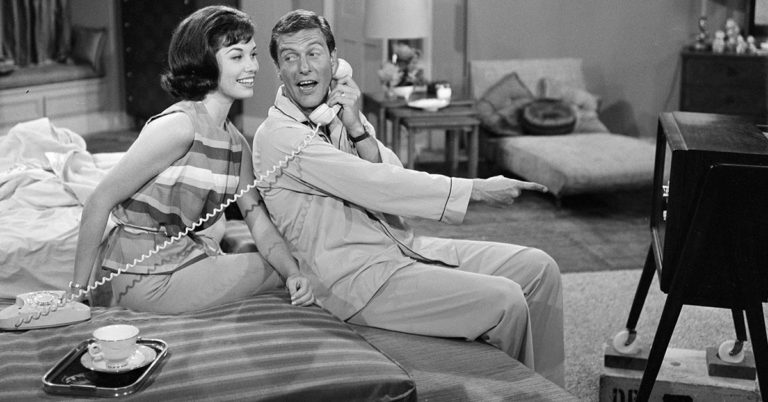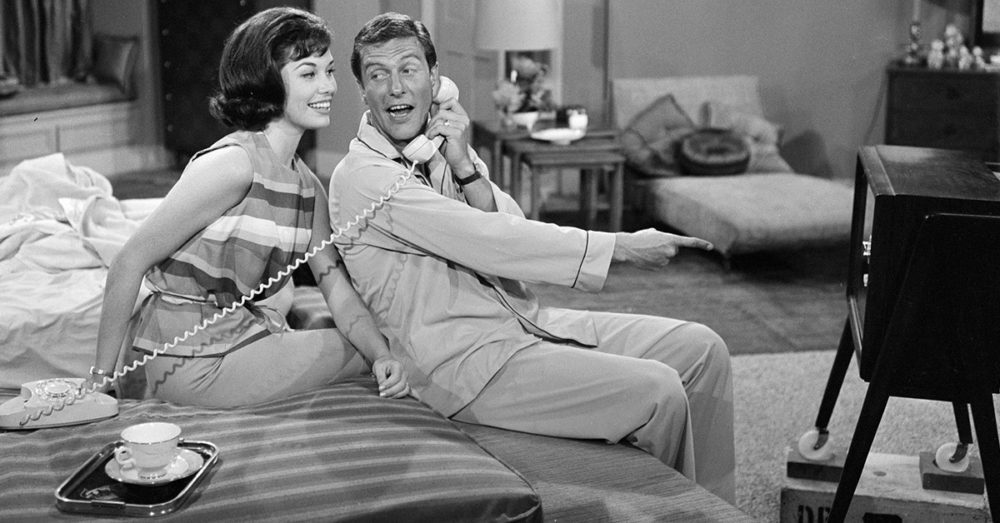
In writing my latest book, Sitcom Writers Talk Shop: Behind the Scenes with Carl Reiner, Norman Lear, and Other Geniuses of TV Comedy, I had the honor of interviewing over 40 successful comedy screenwriters. What did I learn from these masters? Here are the top five takeaways:
1. Know your characters.
Hal Kanter illustrates the importance of knowing your characters with one of his favorite anecdotes. The story is from the Amos ‘n’ Andy radio show, but it applies equally to screenwriting: “All of the writers were sitting in the room with the actors putting together the final script. And we were trying to get a line for the Kingfish; nobody was happy with the line that we had. Everybody was throwing lines back and forth, back and forth. It was a large group of writers, all of whom were excellent, and nobody came up with a line. I finally turned to Freeman Gosden who was the headman and also played the part of the Kingfish. I said, “If the Kingfish himself were to come into this room right now, and you were to explain to him what the problem was, what do you think he would say?” And Freeman immediately shifted into the character and he said, “Well, boy” — whatever the line was — and we all fell down laughing. That was the perfect line! Even Freeman himself was startled by the fact that that character had come out of nowhere. That was a lesson we all learned; you have to know your characters before you sit down and write. And he knew his so well that the Kingfish actually came alive.”
Norman Lear advised his writers to go even deeper: “… For every character that entered, I wanted the writer to know what was on that person’s mind: what was making them unhappy, what was making them happy . . . whether the person had to tie a shoelace, or had indigestion, or didn’t get enough sleep last night, or needed to fart, or was upset with his child or . . . I wanted the writer to know what was on the character’s mind — not just what they said to the convention of speaking as they were entering a room, but what was behind that.”
Do you have a comedy script that will impress our jury? Enter the ScreenCraft Comedy Screenplay Contest.
2. Be specific.
Distinguish characters from each other. Gilligan’s Island creator Sherwood Schwartz felt the increased size of today’s TV writing staffs was a detriment to clearly-defined characters. As he explained, “My grandson is a writer on Scrubs. They have 15 writers… And when you get everyone in that room together, you’re going to throw a joke in to prove your worth. A joke is the easiest thing to do.
So the show’s theme expands to incorporate these jokes, and the jokes aren’t necessarily from the same kind of sensibility — so the characters start to shift a little bit to incorporate all these sensibilities…and it gets away from character. I’ve always said if you’re a good writer, you should be able to remove the name of who says what line in your script, and your show should be so well-defined that anybody can recognize that that’s a line only Gilligan would say, and not Mary Ann. My daughter uses the term ‘homogenized television’ — where everybody is kind of the same. No, you want to distinguish characters, and celebrate their differences!”
3. Story, story, story.
“Story always drives you nuts!” says James L. Brooks. “If you have a good story, other people can make it funny invariably.”
Elliot Shoenman agrees. As Maude’s story editor working alongside veteran I Love Lucy writers, he learned “The sooner you can get the story right, be it a simple story on a sitcom, or a more complicated story -- the easier the week will be from the standpoint of finding the really good humor in the script, because most of your time goes into layering it and polishing it as opposed to redoing stories. Redoing stories kills you after day 1 or day 2. When I ran shows later myself, my priority was let’s not really worry that much about the comedy early on; let’s get the story right. We’ll get the comedy as we go.
…We had readings on Home Improvement where the first act would really be funny, and then [in the second act] there’d be very few laughs. I’d always wonder how did we get so less funny in the second act! And it generally was because we were off story... So get the story right and the characters and their development right — and the comedy will come off of that.”
Learn how to write great movie dialogue with this free guide.
4. You gotta have heart: the power of drama in comedy.
When attempting to explain the success of The Simpsons, Mike Reiss feels “The key thing on The Simpsons is you’ve always got to have some heart in there. But not too much… If you throw in 25 seconds of emotion right at the end — if Homer can be a goof the whole show and then suddenly realize he’s been bad — that will be very powerful to people.”
Phil Rosenthal thinks the poignancy of something beautiful expressed by two people “grounds them as characters; it grounds them as believable. Because we’re not just ha-ha funny all the time.”
Currently teaching at the Academy of Art University in San Francisco, Ken Estin says, “I tell my students that if the show has heart, if it has a soul, if it has those human elements that are so precious to us — it’ll be a better episode. I always thought about finding a really human moment, a really touching moment.”
And how do writers integrate the drama or emotion with the humor? In David Isaacs’ view, it depends on “whether or not the characters and story have a capacity to deal with real issues and real humanity.” He uses Frasier as an example: “The show Frasier was able to do that because the feelings between Martin and Frasier were so strong, and they were such opposites in who they were that their clashes and conflicts could come down to very real father-son attitudes. You could actually have a moment that was fairly dramatic — not for long — but you wouldn’t worry about getting a laugh.”
5. Get real.
The single piece of advice given most often by the writers was simply, to tell the truth.
Carl Reiner believes the truth of the material and of the actors is critical to any show’s success. In his words, “Once in a while, you get a fanciful idea for a show and sometimes that carries it for a time… but really, there’s nothing better than the truth.”
Phil Rosenthal makes the same point: “…As long as you stay in the real world, in the world that’s believable and relatable — then you really can’t go wrong.”
Janet Leahy feels the most important thing she’s learned on the job is to “start with the truth first and then the funny will come later. Because comedy writers are naturally funny.”
She suggests that writers do research to get to what’s real: “If you’re stuck for a story or if you’re stuck in the middle of a story and you don’t know how to get yourself out of it — ask yourself what would really happen in this situation. A lot of times writers will make things up, and that’s why they feel a little awkward, because they haven’t done enough research. Even in comedy, you can do research. And the more truth you find, the more creative your storytelling becomes… go out and do research, meet people, read books, whatever you need to do — but the truth always helps you.”
Drawing from real life was uppermost in Matt Williams’ mind when creating his hit show Roseanne. A prime example is the show’s opening breakfast scene: Matt went to great lengths to make it reflect the explosion of activity most families have every morning.
And when I asked Jay Kogen what he’d learned from his comedy writing father, Arnie Kogen, his response was no surprise: “…Over the years I’ve gleaned from him and from many other writers whom I respect — to tell the truth. Find your truth and tell it.”
###
Cast of Characters:
James L. Brooks: Room 222 (Creator), Mary Tyler Moore (Co-creator), Taxi (Co-creator), The Simpsons (Co-developer)
David Isaacs: M*A*S*H, Mary (Co-Creator), The Simpsons, Wings, Cheers, Almost Perfect (Co-Creator), Becker, Frasier
Hal Kanter: (1918-2011) The George Gobel Show, Julia (Creator), All in the Family
Arnie Kogen: The Dean Martin Show, The Tonight Show Starring Johnny Carson, The Bob Newhart Show, The Carol Burnett Show, Newhart
Jay Kogen: The Tracey Ullman Show, The Simpsons, Frasier, Everybody Loves Raymond, George Lopez, Malcolm in the Middle
Janet Leahy: Newhart, Major Dad, The Cosby Show, Roseanne, Boston Legal, Mad Men
Norman Lear: All in the Family (Developer), The Jeffersons (Developer), Maude (Creator), Sanford and Son (Developer), Mary Hartman, Mary Hartman (Developer), Good Times (Developer)
Carl Reiner: Your Show of Shows, The Dick Van Dyke Show (Creator)
Phil Rosenthal: Everybody Loves Raymond (Creator)
Sherwood Schwartz (1916-2011): I Married Joan, The Red Skelton Hour, My Favorite Martian, Gilligan’s Island (Creator), The Brady Bunch (Creator), It’s about Time (Creator)
Elliot Shoenman: Maude, The Cosby Show, Cheers, Home Improvement
Treva Silverman: The Monkees, Mary Tyler Moore
Matt Williams: Roseanne (Creator), Home Improvement (Co-creator)

As the daughter of Honeymooners writer Herb Finn, Paula Finn grew up in the culture. She is the author of Sitcom Writers Talk Shop: Behind the Scenes with Carl Reiner, Norman Lear, and Other Geniuses of TV Comedy, published by Rowman & Littlefield, and available on Amazon and through Rowman.com.
Photo Credit: The Dick Van Dyke Show
For all the latest ScreenCraft news and updates, follow us on Twitter, Facebook, and Instagram.
Tags
Get Our Screenwriting Newsletter!
Get weekly writing inspiration delivered to your inbox - including industry news, popular articles, and more!



























